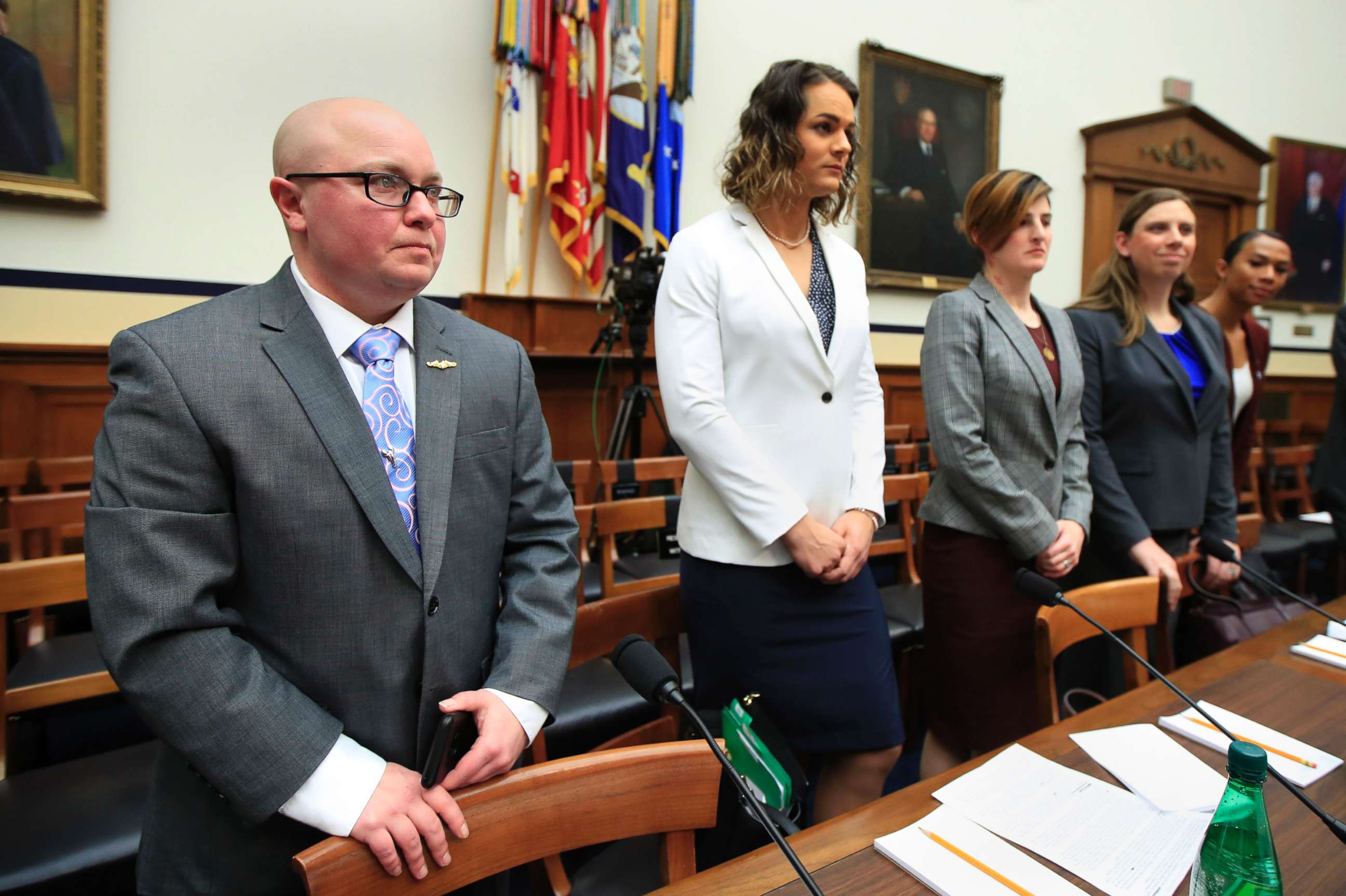Active-duty transgender service members testify before Congress about President Donald Trump's potential ban
President Donald Trump's transgender troop ban is still tied up in the courts.
Transgender service members and top Pentagon officials testified on Capitol Hill Wednesday about the Trump administration's transgender service policy.
Navy Lt. Cmdr. Blake Dremann, Army Capt. Alivia Stehlik, Army Capt. Jennifer Peace, Army Staff Sgt. Patricia King, and Navy Petty Officer 3rd Class Akira Wyatt were the first-ever active-duty transgender service members to testify before Congress.
Their appearance before the House Armed Services Subcommittee on Military Personnel came one month after the Supreme Court granted the Trump administration's request to begin enforcing a ban -- with some exceptions – on transgender military service members while legal appeals continue.
But the Pentagon has yet to enforce the ban because one nationwide injunction against it remains in place.
Chairwoman Jackie Speier, D-Calif., said the hearing was a chance to "dispel the phony myths" around the service of over 14,500 active duty transgender service members, including the idea that those individuals hamper unit readiness and cohesion.
She called the Trump administration's proposed policy "discriminatory, unconstitutional, and self-defeating."
"The focus should remain on individuals' capabilities rather than establishing blanket policies for certain groups," said Ranking Member Trent Kelly, R-Miss., adding, "You all met, meet, or exceed the standards for accession and retention in the military."
Capt. Stehlik told lawmakers that her transition in 2016 actually improved her performance as an Army physical therapist.

Stehlik, who deployed with a striker brigade combat team in Afghanistan, had worried that soldiers would be uncomfortable with her transition but said the troops around her actually opened up more about their own lives.
"I belong in a combat arms unit taking care of my soldiers," she said.
"Transgender service members around the world have done the same thing: add to the readiness and lethality of the United States military," Stehlik added.
Capt. Peace, an intelligence officer with the Defense Intelligence Agency, has served in the Army for 15 years, completing numerous deployments to Iraq and Afghanistan.
"I will be the first person to kick out a transgender service member if they don't meet the standards," she told the committee, adding, "All we are asking for is the opportunity to meet and be held to those exact same standards."
"There is no medically valid reason, including the diagnosis of gender dysphoria, to exclude transgender individuals from military service," Dr. Jesse M. Ehrenfeld, Chair-elect of the American Medical Association Board of Trustees, testified to the committee. "This is the position of most major medical organization."
The proposed ban was first set in motion in July 2017 when President Donald Trump tweeted that he would no longer "accept or allow" transgender individuals to serve in the military, prompting the Pentagon to scramble to revise its policy and triggering legal challenges from critics who called the move discriminatory and unconstitutional.
In the aftermath of the Supreme Court's decision last month, a Defense Department spokesperson said the Pentagon was consulting with the Department of Justice on its next steps with the litigation, but they "look forward to continuing to press our case in the courts."
In the statement, the spokesperson added, "Because it is critical that the department be permitted to formulate personnel policies that it determines are necessary to ensure the most lethal and combat effective fighting force in the world, the department welcomes the Supreme Court's action."
James Stewart, performing the duties of Under Secretary of Defense for Personnel and Readiness, told the committee on Wednesday that the Trump administration's policy is not about transgender individuals, but those diagnosed with gender dysphoria specifically. He said the policy put in place under the Obama administration would "degrade military readiness" in the long term.
The four service chiefs of the Army, Navy, Air Force and Marine Corps have testified in Congress that the presence of transgender service members has had no effect on unit cohesion, discipline or morale.
All of the transgender service members echoed that sentiment on Wednesday.
"We built cohesion in a way that I have never seen in my 19 years of service," Staff Sgt. King, who began transitioning in 2015, said. "That's the value of inclusion."
Petty Officer 3rd Class Wyatt testified that, in her unit, there was "nothing but positivity" after she transitioned in 2015.
"I had enormous support from my superiors and peers," said Wyatt, who immigrated to the United States from the Philippines at the age of 15.




